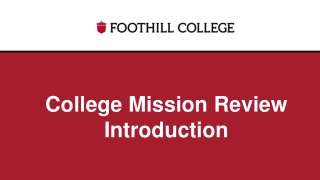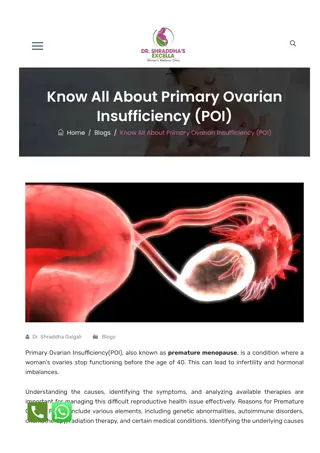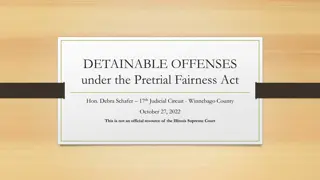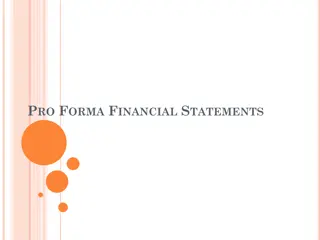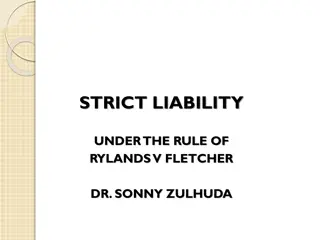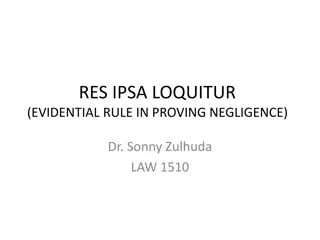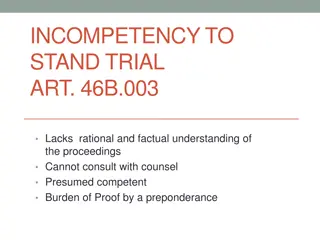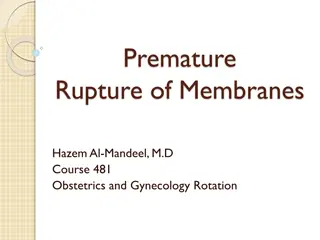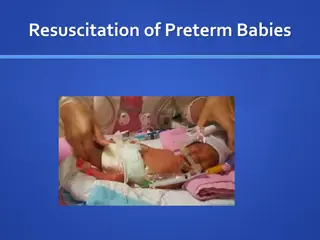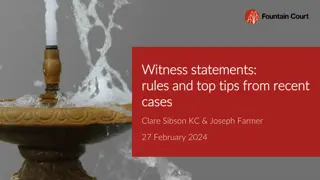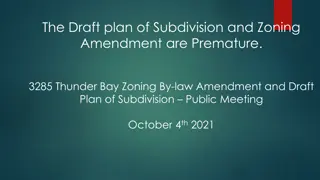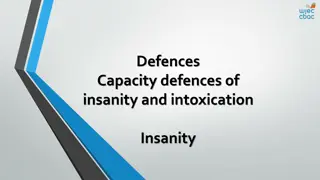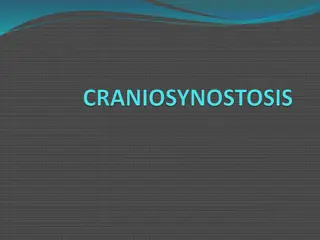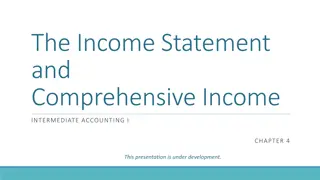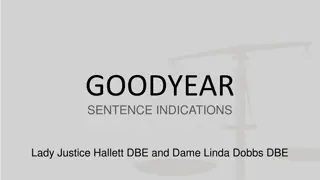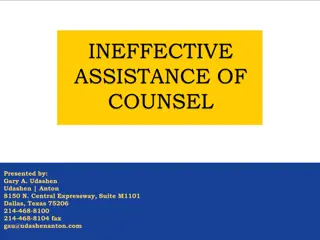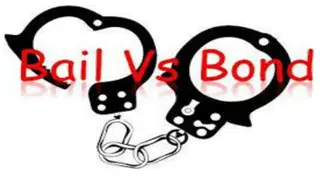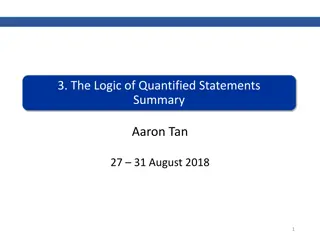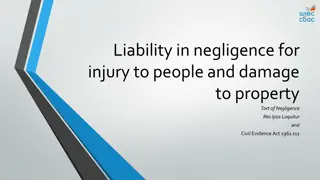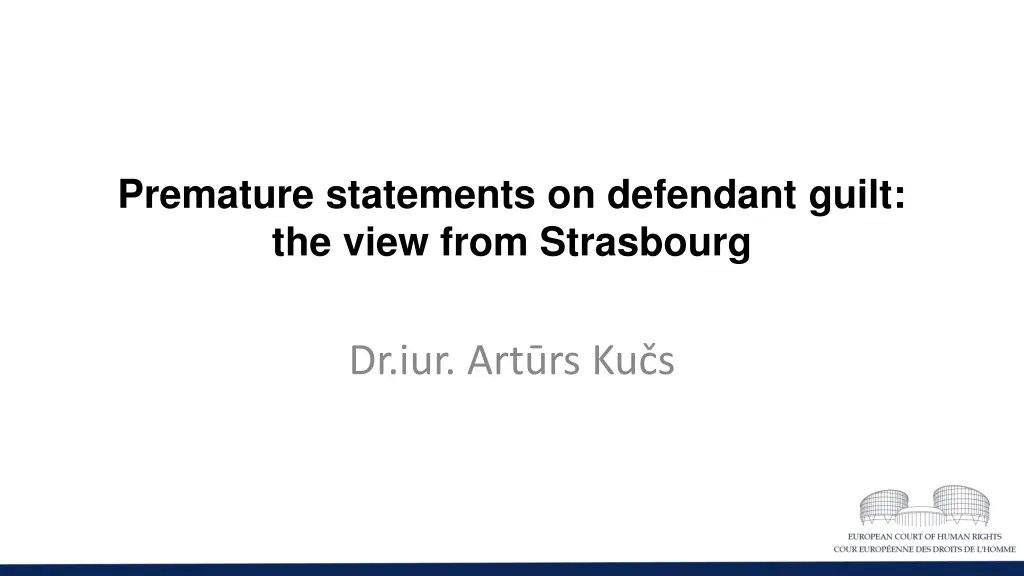
Understanding Breaches of the Presumption of Innocence in Legal Proceedings
Explore the various situations when the presumption of innocence can be breached, such as premature statements by trial courts, judicial authorities, and public officials. Consider the implications of balancing the right to freedom of expression with the right to a fair trial as discussed by the ECtHR and the importance of avoiding imputing criminal liability in subsequent civil proceedings.
Download Presentation

Please find below an Image/Link to download the presentation.
The content on the website is provided AS IS for your information and personal use only. It may not be sold, licensed, or shared on other websites without obtaining consent from the author. If you encounter any issues during the download, it is possible that the publisher has removed the file from their server.
You are allowed to download the files provided on this website for personal or commercial use, subject to the condition that they are used lawfully. All files are the property of their respective owners.
The content on the website is provided AS IS for your information and personal use only. It may not be sold, licensed, or shared on other websites without obtaining consent from the author.
E N D
Presentation Transcript
Premature statements on defendant guilt: the view from Strasbourg Dr.iur. Art rs Ku s
Premature statements on defendant guilt The Court has identified various situations when presumption of innocence can be breached: 1) statements by trial court (Lavents v. Latvia) 2) statements by judicial authorities in subsequent linked proceedings (Episcopo v. Italy) 3) statements by public officials (Rim vics v. Latvia)
Presumption of innocence and freedom of expression Cour de cassation (Court of cassation) - First Civil Chamber Ruling no 26 of 6 January 2021: The normative value of the right to the presumption of innocence and the right to freedom of expression is the same. It is up to the judge to weigh these rights against the interests at stake and to favour the solution that best protects the most legitimate interest - Cour de cassation referred to the ECtHR Grand Chamber judgement of B dat v. Switzerland.
Grand Chamber judgement of Bdat v. Switzerland It is inconceivable that there should be no prior or contemporaneous discussion of the subject matter of trials, be it in specialised journals, in the general press or amongst the public at large. Not only do the media have the task of imparting such information and ideas; the public also has a right to receive them. However, consideration must be given to everyone s right to a fair hearing as secured under Article 6 1 of the Convention, which, in criminal matters, includes the right to an impartial tribunal and the right to the presumption of innocence. Furthermore, when it [the Court] is called upon to adjudicate on a conflict between two rights which enjoy equal protection under the Convention, the Court must weigh up the competing interests.
Statements by judicial authorities in subsequent linked proceedings The ECtHR has repeatedly emphasized that national courts must exercise particular caution when formulating the grounds for a judgment in a civil case following the termination of criminal proceedings. Regardless of whether criminal proceedings ended in an acquittal or a discontinuance the decisions and reasoning of the domestic courts in a subsequent proceedings will violate Art 6 (2) if they impute criminal liability to a person. (Nealon and Hallam v. the United Kingdom [GC], para.167-169)
Statements by public officials What remedies are effective in such cases: criminal proceedings, civil claim or both? Rim vics v. Latvia: The Court previously held that allegations of a breach of the presumption of innocence were normally raised in the course of criminal proceedings against the applicant in order to give the criminal courts an opportunity to place the applicant, as far as possible, in the position he or she would have been in had the requirements of Article 6 not been disregarded. (para.48) [..] The Court has also held in several cases that a civil claim for damages could only be related to the alleged violation and sufficient in part; it could not fully remedy the alleged infringement of the presumption of innocence (see, for example, Konstas, cited above, 29) and thus could not constitute an effective remedy for the purposes of Article 35 1 of the Convention.
Statements by public officials In a number of other cases the Court has found that a civil-law remedy may, in principle, be an effective way of addressing a complaint relating to allegedly prejudicial statements made in respect of ongoing criminal proceedings, either alone or in combination with a criminal-law remedy (see Mamaladze v. Georgia, no. 9487/19, 63, 3 November 2022, and Okropiridze v. Georgia, nos. 43627/16 and 71667/16, 113, 7 September 2023)
Presumption of innocence and defamation proceedings Article 6 2 protects an individual who has been charged with a criminal offence from prejudicial statements which might hinder the fairness of the criminal proceedings. When, however, there are no such proceedings, statements attributing criminal or other reprehensible conduct are relevant rather to the protection against defamation (Ismoilov and Others v. Russia, para. 160;) Similarly, when the impugned statements are made by private entities and are not a direct quotation from any official document provided by the authorities, an issue may arise under Article 8 (Mityanin and Leonov v. Russia, para. 102 and 105). Grand Chamber G.I.E.M. S.R.L. and Others v. Italy , para. 314: What is also at stake once the criminal proceedings have concluded is the person s reputation and the way in which that person is perceived by the public. To a certain extent, the protection afforded under Article 6 2 in this connection may overlap with the protection afforded by Article 8.
Premature statements on defendant guilt There are many open questions in court case- law and room for further discussion on this topic. Thank you all for the attention!

